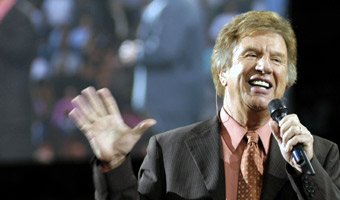WASHINGTON (RNS)—Bill Gaither may not be an A-list celebrity in some circles, but over a half century he has sold 20 million recordings and 20 million DVDs—more than any other gospel performer. And his impact exceeds mere sales figures.
He and his wife, Gloria, have written more than 600 songs, including many published in hymnals used in churches around the world, such as “Because He Lives.”
If he wanted to rest on his laurels, Gaither certainly has enough accolades and money to do so. But at 72, he’s still busy writing, recording and traveling with his current 32-city Homecoming tour. Friends ask Gaither if he plans to slow down any time soon.

Bill Gaither has sold more albums than any other Christian recording artist and, at age 72, shows no signs of slowing down. (RNS PHOTO/Courtesy Lobeline Communications)
|
“Retire? And do what?” he asks in his signature soothing baritone voice. “If I had to sing high C’s every night, or play keyboard at a high level, it would be better to back off. By myself, I’m not really that fantastic. But what I do is bring together talent. And I’ll continue to do that gladly.”
Gaither was a college student in 1956 when he formed the Bill Gaither Trio with a brother and sister.
After he married, Gloria became his primary partner in life, songwriting and performing. The Trio recorded more than 40 albums and filled arenas nationwide.
In 1980, he founded the Gaither Vocal Band. The quartet’s 30 albums feature everything from old-time Southern gospel chestnuts to pop-based contemporary songs.
No one has been more successful than Gaither at bridging the often-contentious divide that separates Christian music’s traditionalists from its harder-rocking contemporary fans.
Sign up for our weekly edition and get all our headlines in your inbox on Thursdays
“Christian music is about a theology and a message and can’t be pinned down by any one style,” he said.
“Over the centuries, that message has been wrapped in a lot of different styles. The wrapper is always changing, but the basic message is always going to stay. I don’t think God really cares about the wrapper, but he cares very much about the content.”
Through the Vocal Band and other activities, Gaither also has promoted and mentored some of the most popular Christian artists of the past four decades, including Sandi Patty, Larnelle Harris, Carman, Steve Green, Don Francisco, Michael English, David Phelps, Russ Taff and Mark Lowry.
“It sounds (like a) cliche, but he really is in a category all by himself,” said John W. Styll, president and CEO of the Gospel Music Association, who credits Gaither with “single-handedly re-energizing” Southern gospel, the genre he’s called home for the most recent phase of his career.
Gaither was working on Homecoming, the Vocal Band’s 1991 album, when he stumbled across the formula that has proved remarkably—and unexpectedly—successful.
He invited about a dozen gospel music pioneers to join in on the classic song, “Where Could I Go But to the Lord.”
After the recording session, the singers ate fried chicken and gathered around a piano to shoot a music video. Before they knew it, someone started playing the piano and the singers all joined in.
Three hours had passed before the singing finally stopped, Gaither recalled, and he realized the video camera had captured nearly an hour of the impromptu session. Four minutes were used for the music video.
The remaining footage gave birth to a Homecoming phenomenon that has spawned dozens of CDs, more than 60 DVDs, broadcasts on more than a dozen cable outlets like TNT and a popular concert tour that in 2004 outsold tours by Rod Stewart, Elton John and Fleetwood Mac.
Homecoming’s success has provided steady work for a revolving roster of musicians and singers.
And Gaither has plowed some of his earnings into the Gospel Music Trust Fund, which supports aging or ailing artists. In 1991, the fund had about $20,000 in its bank account; today, it is worth nearly $3 million.
Gaither is surprised by the popularity of the Homecoming franchise, which he attributes to the sense of community and shared collective memory the music creates among both the artists and fans.
“The Christian church has often been guilty of neglecting its history,” Gaither said. “But if you show me a person who does not know where he’s been, I’ll show you someone one who does not where he is going. The result is spiritual arrogance.
“What we’re trying to do with the music we sing at the Homecoming concerts is salvage the best of the past.”
















We seek to connect God’s story and God’s people around the world. To learn more about God’s story, click here.
Send comments and feedback to Eric Black, our editor. For comments to be published, please specify “letter to the editor.” Maximum length for publication is 300 words.